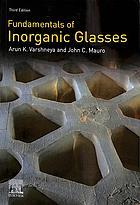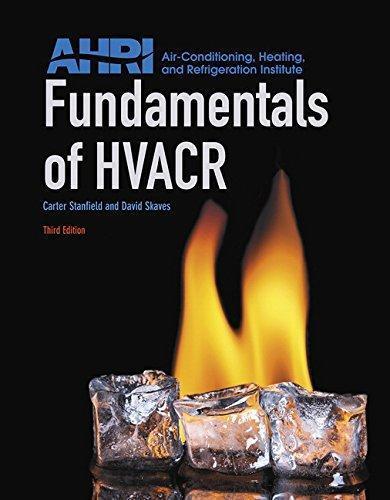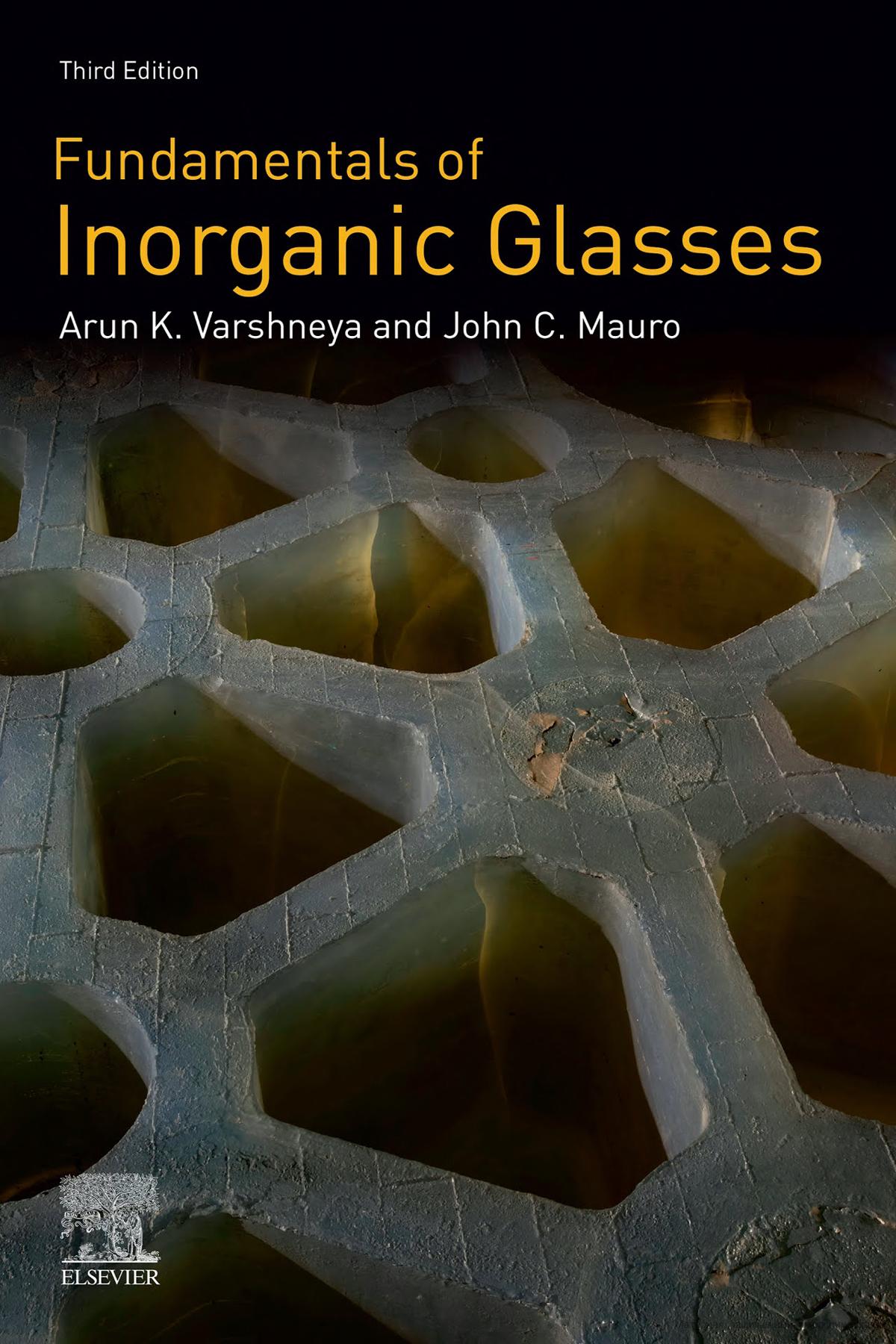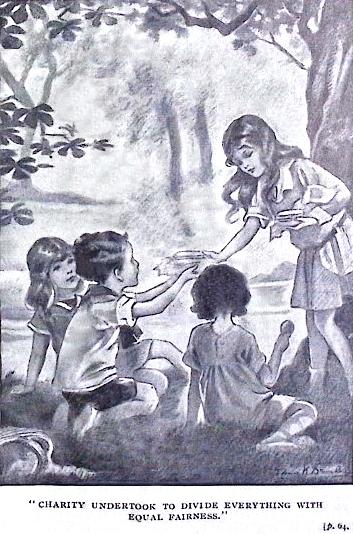CHAPTER1 Introduction
1.1Briefhistory
Theword glass isderivedfromalate-Latinterm glæsum usedtorefertoa lustrousandtransparentmaterial.Otherwordsoftenusedtorefertoglassy substancesare vitreous, originatingfromtheLatinword vitrum (¼transparent orclear),and amorphous,originatingfromGreek amorphe (¼withoutformor shape).Near-transparency,luster,orshine,andinparticular,itsdurability whenexposedtotheelementsofnature,wereprobablythemostsignificant propertiesofglassrecognizedbyearlycivilizations.Glazedstonebeadsfrom Egyptdatebackto12,000BC.Severaloftheartifactsunearthedfromthe tombsofthepharaohsexhibitexcellentglassinlayworkinavarietyof colors.Asindependentobjects,glasswareperhapsexistedforroughly 5000–6000years.Thetechnologyofglasswindows,exploitingtheproperty ofopticaltransparency,haddevelopedaroundthebirthofChrist,andwas developedtonewheightsofartistrybytheChristianChurchduringthe MiddleAges.Manyofthesebeautifullystainedwindows,whichcanstill beviewedinanumberofchurchesovertheEuropeancontinent,show thedeepcommitmentofthechurchtopreservethehistoryofmankind andreligiousteachingsthroughthemediumofglass.
Manyoftheusesofglassinthemodern-dayworldcontinuetoexploit thetransparency,luster,anddurabilityofglass.Containers,windows,lighting,insulation,fiber,stemware,andotherhandcraftedartobjectsaretypical ofthesetraditionaluses.Atthispoint,itisworthnotingthatforamaterialto beusedinaproductitmusthavecertaindesirablepropertiesthatdetermine itsuse.Inourlaterdiscussions,itwillbecomeclearthatthepropertiesof transparency,luster,anddurabilityareneithersufficientnornecessarytodescribe “glass.”Similarly,being“amorphous”doesnothavethesamemeaningasbeing aglass.Throughtheapplicationofbasicsciencestothestudyofglass,newer propertiesofglasseshavebeendeveloped,andhence,newerproductshave beenconceived.
Asmaybeexpected,muchofglasssciencedevelopedbasedonmajor commercialusesofglass.Morethan95%ofthecommercialtonnageofglass consistsofoxidecompositions.Byfarthelargestpercentageoftheseis
silica-based.Thisincludesbothcommodityglassproductsandhighlyspecializedapplicationsofglass,suchasinmicroelectronicpackaging,where theannualvolumeofsalemaybelowbutglassisakey“value-adding”component,thatis,theapplicationofglassiseitheracriticalcomponentor enhancesthevalueoftheassemblyaftertheincorporatingprocess.Itis notsurprisingthatwhentheterm“glass”isusedinscientificconversation, oxideglassesareusuallyimplied.Overthepastfewdecades,however,a greatmanystudiesofnonoxideglasseshavebeentriggeredbythepossibility ofsomeexoticusesofglassinthefieldsofhealthcareandinformationtechnology.Itiswell,therefore,toreviewourthoughtsonthevariousfamiliesof glasses,theircompositions,andtheirusesbeforewedelveintothedetailed scienceofglass.Inorganicglassfamiliesandtheircompositionranges developedthroughthe1970shavebeenextensivelydiscussedbyKreidl [1],Rawson [2],andVogel [3].
1.2Glassfamiliesofinterest
Table1.1 summarizesthechemicalcompositionofseveralcommoncommerciallyavailableinorganicglassproducts.Alloftheglasseslistedhereare silica-based.Manyofthesearereclassifiedin Table1.2 intofivemajorcompositionfamiliesshowingthekeypropertiesresponsibleforthecommercial interest.
Onemaynotethat,besidessilica,othermajorconstituents(amountgenerally greaterthan 3%)arealkalioxides,alkalineearthoxides,alumina,boricoxide, andleadoxide. Manyofthesameoxidesmayalsobepresentasminorconstituents.Compoundssuchasarsenicoxide,tinoxide,andcolorantsare oftenintentionallyaddedintraceamounts(lessthan 0.3%).Notshown arethepresenceoftraceimpuritiessuchasironoxideandhydroxyl,which arecommoncontaminantsintherawmaterialsusedintheglassmeltingprocess.Thereasonsformanyoftheseadditionsofdifferentcomponentswill becomeclearaswecontinue.Inmorerecentyears,theuseoftoxiccompoundssuchasleadoxideandarsenichascomeunderpressureduetoconcernsoverworkersafetyandenvironmentalprotection.Severalofthe variousglassfamiliesarediscussedbelow.
1.3Vitreoussilica
Vitreoussilicaisthemostrefractoryglassincommercialusage.Inadditionto itsabilitytowithstandexceptionallyhightemperatures,ithasahighresistancetochemicalcorrosion(particularlytoacids),averylowelectrical
Table1.1 Commercialglasscompositions(wt%oxides)
Table1.2 Oxideglassfamilies,keyphysicalproperties,andapplications
PropertySilicaSodalimesilicateBorosilicatePb-silicateborateAluminosilicate
ChemicaldurabilityVvvgoodGoodVgoodGoodVvvgood
ElectricalconductivityVvvlowLowLowVlowV – vvvlow
Workingrange Long –
UV -transparencyHigh
Refractiveindex High –
Elasticmodulus HighHigh
CostHighVlowMediumLowMedium
ApplicationsFurnacetubes, cruciblesforSi melting,UV windows
Container,flat, incandescent/ fluorescentlamps
Chemicallabware, pharmaceutical/ cosmeticsware,auto headlamps “Crystal”ware,art/ intricateshapes, sealingglasses Halogenlamp, fiber-reinforced plastics
conductivity,averylow( 5.5 10 7/°C)coefficientofthermalexpansion (CTE),andgoodultraviolet(UV)transparency.However,becauseofthe highcostofmanufacture,theusesofvitreoussilicaaremostlylimitedtoastronomicalmirrors,opticalfibers,cruciblesformeltinghigh-puritysilicon,and high-efficacylampenvelopes.Inonetechnique,theglassisobtainedbymeltinghigh-purityquartzcrystalsorbeneficiatedsandattemperaturesinexcess of2000°C.Inasecondtechnique,SiCl4 issprayedintoanoxy-hydrogen flameorwatervapor-freeoxygenplasma,reactingtoformSiO2 vapors, whichdepositonasubstrateandaresubsequentlyconsolidatedat 1800°C.
1.4Sodalimesilicateglass
Sodalimesilicateglassisthemostwidelyusedofallcommercialglasses. Mostbeveragecontainers,glasswindows,andincandescentandfluorescentlampenvelopesaremadefromsoda limesilicateowingtoitslowcost, goodchemicaldurability,andhighopticaltransmissioninthevisible region.BecauseofitsrelativelyhighCTE( 95 10 7/ °C),itisprone tothermalshockfailure,andthispreventsitsuseinanumberofapplications.Large-scalecontinuousmeltingofinexpensivebatchmaterials suchassodaash(Na2CO3),limestone(CaCO 3),andsand(SiO2)at 1400 –1500°Cmakesitpossibletoformtheproductsinexpensivelyand withhighthroughput.
1.5Borosilicateglass
Smallamountsofalkaliaddedtosilicaandboronoxideyieldafamilyof glassescommonlyutilizedfortheirlowthermalexpansioncoefficient ( 50 10 7/°C)andespeciallyhighresistancetochemicalattack.Laboratoryglassware,pharmaceuticalglassware,householdcookware,and automobileheadlampsareprimeexamplesofborosilicateglassusage. AmoreimportantapplicationistheuseofaTypeIborosilicateglasscartridgetocontainepinephrineinautoinjectordevicesforemergencyantidote topreventanaphylacticshockfromsevereallergiestobeestings,peanuts, andshellfoods,whichotherwisecouldpotentiallyleadtodeath.Theglass cartridgeischemicallystrengthenedtoreduceglassfractureprobabilitydue toappliedforceduringemergencyadministration.Borosilicateglassescanbe madecommerciallyinamannersimilartosodalimeglassesbutrequire highertemperaturesformelting( 1550–1650°C).ThehighermeltingtemperaturesandhighercostofB2O3 rawmaterialsmakeborosilicateglasses muchlesscompetitivecomparedtosodalimesilicateforcommonproducts.
1.6Leadsilicateglass
ThisfamilyofglassescontainsPbOandSiO2 astheprincipalcomponents, withsmallamountsofsodaorpotash.Theseglassesareutilizedfortheirhigh degreeofbrilliance(asstemwareorthemisleadinglynamedlead“crystal”), largeworkingrange(usefultomakeartobjectsandintricateshapeswithout theneedtoreheattheglass),andahighelectricalresistivity(e.g.,forelectrical feedthroughcomponents).PbOadditionsincreasethefluidityofglassandits wettabilitytooxideceramics.Hence,highleadborosilicateglasses(generally withoutanyalkaliadditions)areusedextensivelyinmicroelectronics(e.g.,for conductor,resistor,anddielectricpastes).Becauseofthetoxicityoflead, alternateformulationsforavarietyofproductsarebeingexplored.
1.7Aluminosilicateglass
Theelectricalresistanceofthealkali-freealkalineearthaluminosilicates oftenapproachesthatofvitreoussilica.Themostimportant21st-century applicationofthealkali-freealuminosilicatesisinliquidcrystaldisplayflat thinglasssheets.Manyoftheglassesareintermediatesbetweenthesoda limesilicateandvitreoussilicaforrefractorinessandthermalexpansion ( 30–50 10 7/°C).Anothercommercialuseofthesecharacteristicsis inthehigh-efficacylampsinvolvingtungsten-halogencycle(forinstance, thelampinsideanautomobilehalogenheadlamp)wheretheglasscanbe sealeddirectlytomolybdenumelectricalleads.Aluminosilicatesgenerally havehighvaluesofelasticmoduliandahighresistancetochemicalcorrosion.Compositionscommonlyreferredtoas“E-glass”and“S-glass”are usedastheload-bearingfibercomponentinfiber-reinforcedplastics.
Alkali-containingaluminosilicateglassesformthebasisforanumberof ultrahighstrengthglassproductswherethestrengtheningisachievedchemically usinganionexchangeprocess.Throughtheionexchangeprocess,acompressivestresslayerofaround1GPacanbedevelopedattheglasssurfacetoprotect againsttheintroductionandpropagationofdamage.Chemicallystrengthened aluminosilicateglassesarecommonlyusedasaircraftwindshieldsandasthin displaycoversforsmartphonesandotherpersonalelectronicdevices.
1.8Bioactiveglasses
Bioactiveglasses,forexample,glassesthatstimulatesomedesiredeffectin thehumanbody,wereoriginallydiscoveredinthe1960s.Bioactiveglasses
includeavarietyofsilicateandboratecompositionsthataredesignedtobe surfacereactivewhenimplantedinthebody [4].Thesurfacereactioncontributestheneededchemicalstostimulatehealingofhardorsofttissuesin thebody.Forexample,bioactiveglassesarenowusedtopromoteregenerationofbonetissueorthehealingoffleshwounds.Bioactiveglasseswillbe coveredindetailin Section23.8.
1.9Othersilica-basedoxideglasses
Manyotherfamiliesofsilica-basedglassesexist,includingopticalglassesused inopticalcomponentsanddevices,suchasophthalmics.Theinclusionof BaO,ZnO,La2O3,Nd2O3,orotheroxides,oftenasmajorconstituents, insodalimesilicate,leadsilicate,orborosilicateglassesyieldscompositions withusefulrefractiveindexandopticaldispersionproperties.
1.10Othernonsilica-basedoxideglasses
Oxideglassesnothavingsilicaasaprincipalcomponenthavesignificantly lesscommercialusage.B2O3-basedandP2O5-basedglassesarereadily attackedbywater.However,theirstudieshavebeenextremelyimportant towardenhancingourunderstandingofglassstructure.Somenonsilicate oxideglassesthathavecommercialinterestincludethealkalineearthaluminophosphates(forlaserhosting),boroaluminates(e.g.,“cabal”glasseswith electricalresistivitiesexceedingthatofsilica),alkalineearthaluminates(asa high-temperaturesealantandinfrared(IR)-transmittingglass),low-melting temperatureV2O5-basedglasses,andbioactiveB2O3-basedglassesforsoft tissuerepair.Manyoftheseglasseshaveverylowliquidustemperatures andarequitefluidcomparedtosilicateglasses.Hence,someoftheseglasses havefounduseinsealingofelectroniccomponents.Moreover,theespeciallyhighrefractiveindexoftelluriteglasses(inexcessof2.0)makesthem usefulinopticalsystems.
1.11Halideglasses
Becauseofhighsolubilityinwater,simplehalideglassessuchasBeF2, ZnCl2,andtheirmixtureswithalkalihalideshavelittlecommercialinterest despitethefactthattheirreadyglassformabilityhasbeenknownsincethe 1920s.Oftheknownhalideglasses,thosebasedentirelyonheavymetal inorganicfluorideshaveattractedthemostattentionduringthe1980s.It
Another random document with no related content on Scribd:
CHARITY UNDERTOOK TO DIVIDE EVERYTHING WITH EQUAL FAIRNESS.
Up to now they had seen very few people. A boy driving cattle in the distance was an Indian chasing buffaloes; an old man with a dog was a chief with his wolf hound.
But when they took to their raft again, their sharp eyes spied a fisherman some distance away with his line across the stream.
"Now you'll hear him swear," said Charlie, with a delighted chuckle. "I know what fishermen are like. I've passed them before."
"He isn't a fisherman," said Hope; "he's a pirate looking out for ships from his island."
"It's a pity we have no gun to blow him to pieces! My dear husband, put a bit more strength into that old punt stick of yours! Let's rush down the stream and pull hold of his line—perchance we may pull in the pirate to his death!"
So all four got hold of their oars, and by dint of prodding the banks in punt-like fashion, the raft began to quicken its pace. The fisherman saw them before they reached him and pulled in his line. He did not swear but laughed heartily as the raft approached.
"Who the dickens is this?" he asked. "Here, hi, don't pass me by! Is there room for me on board?"
He was a tall, broad-shouldered young man.
Charlie threw a ferocious look at him.
"You're a pirate, let us pass!"
The young man had stopped the raft with his foot. Charlie was rather exhausted with his efforts, and the little girls were panting for breath.
"If I'm a pirate, I beg to tell you that this water is mine, and that you are my prisoners. You'll land at once, and forfeit your ship."
With a quick, dexterous stroke, he had seized hold of the rope, and drawn the raft close to the bank.
Winding it round a tree stump, the discomfited voyagers found their passage stopped.
Charity looked up into the pirate's face. She saw that his eyes were twinkling, and she felt reassured.
"The ocean is free to all," she said boldly.
The young man pointed to a board close by.
"Private water. Trespassers will be prosecuted."
And then Charlie saw that he had brought his raft along the wrong bend of the stream. He had seldom before come as far as this.
For a moment the little Captain looked perplexed.
"We are on a peace voyage," he said, "otherwise with cutlasses and guns we would make short work of you. We are searching for an island called 'Tarjak,' and for treasure thereon."
"Ah," said the young man in a mysterious tone, "now you've come to the right party. I know the very spot and will lead you to it, if I may share in the booty."
"He means treachery!" said Charity in a loud whisper.
"I've got you in my power!" said the young man sternly.
Charlie and the little girls hastily consulted together.
"We'll just let him join us," was Charlie's decision.
Then he turned to the stranger.
"Now will you lead us?"
"I'll tow you along," was the cheerful reply. "You have spoilt my fishing, but I'll take you straight to a treasure island such as you have never seen before."
In a very short time, this amazing young man was marching along the banks rope in hand, and the raft was being towed along without any effort on the part of the crew. They gave themselves up to the delight of it, for all small backs and wrists were aching, and it was delicious to be towed along so swiftly, without any effort.
And presently the stream widened considerably and a veritable small island appeared. The Pirate used the oars now, and stood in the middle of the raft himself. He brought it to the edge of the island and told the children to get out.
To their delight there was a tiny thatched hut in the middle of it.
"Years ago," said the pirate, "I landed here in a small boat, having been shipwrecked, and having lost all I possessed. I built myself this hut and lived here in peace, quitting it for rougher waters and sea fishing occasionally. For the most part I lived on fish. One day I was digging for bait, when I stumbled on a—a cache, and in a certain spot on this island is one hidden now. Treasure is in it. If you have brought spades, dig away till you find it. I will give you a clue. Four paces from Security, an arm's length to the right, dig for two feet down!"
"We haven't any spades," said the little girls. "The Captain has the only one."
The young man went into the hut, and soon appeared with a pitchfork and two spades of very small proportions.
"And now," said Charity, "where is Security? It must be the hut, of course!"
In a very few minutes each child was digging four paces from the hut. But Charlie began to flag, whereupon the young man whispered something to him.
"Your Captain is ill," he said; "he's going to rest. I'll take his place."
Charlie sat down on the step leading to the hut and watched the others with a rather bitter face. It was hard to be bowled over so soon, just when he would like to prove his strength to be superior to the girls.
Digging went on steadily, but the three little girls made slow progress.
The young man dug too, but he presently said, "I'll give another clue:"
"By the side of a singer's home, a hand's span from the base."
The little girls were completely puzzled. Charlie's bright eyes roved to and fro. At last his face lightened.
"I have it. A singer's home is a bird's tree, and the base is the trunk of it. There's only one tree which it can mean, and it's the ash tree between Bolt and Ben."
Charity made a rush to the spot, and Charlie sprang up declaring he was quite rested. He and the three girls all attacked the ground round the ash tree, and the young man quietly slipped into the hut, leaving them at work.
It was not long before Charity's spade hit against something hard. Then four eager pairs of hands dragged it to light. It was a rusty tin box tied with string and sealed.
Charlie took command as Captain, and cut the string with his clasp knife. His face was solemn as he did it, but the little girls' faces bubbled all over with curiosity and delight.
It was hard to open, but at last the lid gave way, and then Charlie very carefully lifted out the contents.
Four black farthings, a blue marble, and two peach stones.
Faith's face fell; she was dreadfully disappointed. She had really expected to find it full of precious stones.
Charity danced up and down.
"Golden sovereigns, a blue jewel worth a million pounds, and seeds of a pomegranate that grew in Paradise!" she cried.
Charlie turned to her with an approving face.
"You are right, my wife, wonderful treasure indeed! Does the Pirate mean to let us carry it off?"
"The Pirate invites you to a meal. He is tired of a very lonely life and welcomes treasure seekers to his home."
It was the young man who spoke. The children dashed into the hut, Charlie clutching his tin box. There another surprise awaited them.
A kettle was boiling merrily. A cake was on the table, and some ham sandwiches. The Pirate had cups and saucers, and was measuring tea into a brown teapot.
"We have no cow on the island, but we have sugar and good tea. Let us fall to!"
It seemed like magic. The children sat up round a little table and they had a merry meal. After it was over, the treasure box was produced and the treasures divided. The Pirate took one of the peach stones. Charity took the other.
"I as Captain's wife have first choice," she said. "I am going to plant this wonderful seed, and perhaps it will spring up into a magic tree which will reach the sun."
Charlie gave Hope and Faith a farthing each.
"A guinea for Bolt and Ben," he said. "I being Captain keep the blue diamond and a guinea, my wife can have the other."
Then the Pirate pulled out his pipe, and sitting cross legged on the ground told them the most wonderful story of how the treasures had been obtained and hidden away. The children listened breathlessly, but at last the Captain said it was getting late, and they must go. The Pirate took them back to their raft, and then he surprised them again. He got out a very small boat from under the willows, tucked himself into it, and fastening the rope of the raft to his painter, rowed gaily off down the stream, towing the children back to the spot where he found them. Then he bade them good-bye.
"We shall never meet again most likely," he said, "but I warn you to keep to your own waters. There are other
pirates who would make short work of you should they find you where I did!"
The children waved their hands gaily to him. Charlie was supremely happy, and content at the result of his voyage after treasure, and all their tongues wagged fast as they made their way down the stream towards Charlie's home. It was nearly six o'clock when they got there, so the little girls bade their new friend a hasty good-bye.
"It has been perfect—simply perfect!" said Charity, and the others echoed her words.
They ran home then as fast as they could, and told Granny all of their adventures.
"Who do you think the Pirate can be?" Faith asked. "He has such nice kind eyes, but a very grave face."
Granny said she could not possibly tell, and Aunt Alice could not help them.
But the next day the rector's wife paid a long call. Charity happened to be in the room, and though she was as quiet as a little mouse she kept her ears wide open, and when she was alone with Hope and Faith she was quite excited.
"I believe Mrs. Webster was talking about the Pirate, I believe she was! She told Aunt Alice she had a little grandson staying with her last week, and she wished she had asked us over to tea with him, as he was so lonely. And then she said that Fred Cardwell had been so good to him. He had taken him off fishing with him several days, and had entertained him on an island which the little boy had loved. She asked Aunt Alice if she knew the Cardwells, and I pricked up my ears and listened hard. Aunt Alice said no,
and she said Fred Cardwell lived with a very cross, ill father —I think he's a squire, like Sir George, and they live about five miles from here. The father is parry—something—a long word, and Fred had to come home and look after him, and he's no mother or brothers and sisters, and Mrs. Webster said it was a terrible life for him, and it made him gloomy, and he doesn't go anywhere or won't know anybody, but he likes children and she said her little grandson loved him. Don't you think Fred may be our pirate? Because there can't be lots of islands about, and perhaps that was why he had cake and tea in the hut, he had put them there when the little boy was with him!"
Charity paused for breath.
"I wish we could see him again," said Faith.
"We'll keep a sharp look-out along the roads when we walk," said Hope. "Mrs. Cox wasn't at all right about the country. We do meet people very often, and we may meet him."
"We'll ask Lady Melville if she knows him when we see her next," Charity said; "and now I'm going to plant my magic seed. Come and see me do it."
So Hope and Faith accompanied her to the little garden, and she planted it just below their bedroom window.
"Perhaps it will be like Jack's beanstalk, and grow so high that we can step out of our window on to its branches," said Hope.
"It's sure to be different from any other tree, for it has been hidden away for years, I'm sure," said Charity.
They did not see Charlie for some time after this. They heard that he was ill, and one day a letter came from him addressed to "My Wife and Crew."
The little girls opened it with great delight. It was very short.
"This is to tell you that youre Captin lies dangirosly wunded, and his sickness is suvere. His next voyage will not take plaice, and when he gets better Ben is to come to him to delever messages to his wife and to Bolt.
"Charles, Captain of the 'Success.'"
Faith was Ben. She wondered why she was especially invited. Charity tossed her head.
"He knows he can do what he likes with Faith. I expect none of us will be able to go with him now, for Aunt Alice said we were to begin lessons. This new governess, Miss Vale, is coming next Monday."
"Well, anyhow," said Hope, "I'm glad it isn't school, and Aunt Alice says she will be very nice."
"I must answer his letter," said Faith.
But she was not very fond of letter-writing and put it off. She left Charity and Hope playing in the orchard that afternoon and went off to visit her friend the shepherd. There was nothing she enjoyed so much as creeping into his little cottage and sitting on a small stool in the chimney corner with the old man. Sandy would come and rest his
nose in her lap, and she and Timothy found plenty to say to each other. She told him all about Charlie, and the raft and the Pirate.
"'Tis a pity the little laddie enjoys such poor health," said Timothy to her. "The doctor be such a hearty man, but there—the Lord have a way of His Own with each o' us, and 'tis ordained for him to be weakly. I often sits and thinks o' strength. 'Tis misused in the body, and if so be the soul is strong, 'tisn't so much odds about the body!"
"I wonder how strong my soul is," said Faith. "I'm not very strong in my body, Granny says. Can I make my soul strong, Timothy?"
"Ask the Comforter," said the old man. "He'll strengthen the weak. We are told 'He helpeth our infirmities.'"
"What do infirmities mean?"
"Our weakness and ailments, surely. The Book says, 'We can be strengthened with might in the inner man' by Him."
"Is our inner man our souls?" asked Faith.
"I suppose I have an inner woman—I'm not a man."
"'Tis just a figure o' speech. 'Tis your little soul you want to be made strong."
"I like the Comforter very much," said Faith softly and reverently; "He came and comforted me this morning, Timothy. Aunt Alice scolded me because she told us not to leave the front door open, there was such a wind. And Hope left it open; she came out last, and the wind knocked a china vase off the table, and broke it, and Aunt Alice was very angry and scolded me, because she thought I'd gone
out last. And I went away and cried, and then I distinctly felt the Comforter near me, and I asked Him to comfort me. I almost felt He took me in His Arms. He was so close. And I kept quite still, and then I couldn't be sorry any more, for I knew He knew I hadn't done it. He was so kind!"
Faith heaved a sigh of happiness, and Timothy nodded his head.
"'Tis just so!" he said simply.
And then they began to talk about Sandy and the sheep, and when she left the cottage, Faith's little face was radiant.
"I feel when I'm talking to you," she said as she bade the old man farewell, "that I'm getting happier every minute. I shan't be able to come and see you so often when we do lessons, but I'll come whenever I can!"
Charity and Hope could not understand her friendship with the old man. But Faith paid no heed to them. She was a quiet, old-fashioned child, and loved to go her own way without any interference of other people.
CHAPTER VI
CHARLIE STILL IN COMMAND
MISS VALE arrived on Monday, and the little girls fell in love with her. She was very pretty, with bright, dark eyes, and a quick, cheerful manner. But they found she was very firm and strict in some things, and lessons could not be trifled with.
"I shall not give you any lessons you cannot prepare, and when I come I expect to find them done. If they are not, I shall conclude it is idleness that is the cause and will deal with it accordingly."
This sounded very alarming, but the children found that she was right, and that there was no excuse for their lessons not being learnt.
She came from nine o'clock to one, and they had an hour every afternoon in which they did what they called their "prep" for her.
Charity and Hope did everything together, Faith could not keep up with them. She was slow and persevering, but not very clever at books. Yet Miss Vale, if she had any preference, liked to teach her the best of the three, for her whole heart was in what she did, and she was extremely conscientious.
In a few days' time, Faith was allowed to go to see Charlie. His mother met her at the door.
"My boy did too much with you that day. He has been in bed ever since. His father says there must be no voyages down the stream for a long time to come, so don't encourage him to talk about it."
Faith was taken into the sitting-room, where Charlie lay on the couch, looking very white and frail, but he greeted her most cheerfully:
"Come on, Ben. Isn't it hard lines for me?"
"What's been the matter with you?" asked Faith in a sympathetic tone.
"Oh temperature; it's always that. My head nearly bursting and I'm hot as fire! But I'm all right now. What have you been doing?"
Faith gave an account of their days since last they met, and from being very bright Charlie's spirits sank, and he began to talk most gloomily.
"It's no use my trying to do anything like other fellows. If God had made me a girl, I shouldn't have minded half so much, but boys are meant to be strong, and I think it's a shame I shouldn't be. I quite hate myself sometimes. If I was meant to be weak and ill, I oughtn't to have been born a boy. It was a big mistake."
"But," said Faith with rather a shocked look, "God borned you, and He can't make mistakes. And I don't see why girls should be ill and not boys. Besides, Charlie, if you aren't strong outside, you can be inside. I was talking with my friend Timothy about you. He said:"
"'It wasn't any odds about the body, it's the soul that really matters.'"
"Don't you like people with strong souls?"
"I don't know what they're like," Charlie said, staring at her.
Faith's eyes grew big and glowed with light as she replied:
"Oh, they're heroes!—Always smiling at difficult days and going straight on with their heads up, even if they're hurt. I've thought about them a lot. And I'm hoping the Comforter will make my soul grow big and strong. I should like never to cry when I'm hurt, and never grumble when things are horrid! And keep smiling even if the whole world turned against me and trampled me down!"
Faith spoke with such fervour that Charlie was much impressed.
She added:
"We all think you have a strong soul because you're so cheerful."
"Oh, I'm not!" said Charlie. "I've been beastly to Mother I'm so awfully disappointed that Dad won't let me go on the raft. It's the one thing I really enjoy! There's nothing else I can play at. It does seem a shame."
"We play lots of games," said Faith, "and we've no raft."
"No, but you are girls, and you can run about, and climb trees. I've had a miserable time shut up here all alone."
"I suppose," said Faith shyly, "you wouldn't like the Comforter to stay with you? I think you would feel better if He did. I don't know Him very well yet, but Timothy talks to me about Him. And I think it's so wonderful that He likes coming and living with boys and girls and making them happy and good and strong!"
"What do you mean?" asked Charlie.
"Timothy told me about Him first. If you're ill and unhappy, He would like to come to you and comfort you.
That's why He's called the Comforter. Wherever He goes He comforts, and He does it perfectly, because, you know, He is God."
Faith's voice sank to an awed whisper.
"What a funny girl you are!" said Charlie. "You seemed as if you were talking about a real person!"
"But the Comforter is real."
"Well, a real person is somebody you can see."
"If you can't see Him, you can hear Him," said Faith gravely. "There are lots of real things we can't see. The wind—"
"Oh, I know, but you're preaching a sermon."
"Am I?"
Faith subsided into silence. Presently she said:
"Then I can't tell you how to be happy and comforted, if you won't believe what Timothy says."
"Can you find out this puzzle?"
Charlie would have no more serious talk; and produced a little puzzle box with a padlock which opened itself in a wonderful way; Faith was interested at once. She paid him quite a long visit, and when the time came for her to go, Charlie produced two packets which he charged her to give to the wife and to Bolt.
"They're my wishes," he said. "You signed on to do what I told you for a year, and I'm still in command, though I'm ill!"
"Aye, sir, aye!" said Faith, saluting him in best style.
Then she went home, and Charity and Hope opened their packets eagerly.
There was a great deal of paper but not much writing. Charity's was as follows:
"Captain Charles sends greetings to his wife. He wishes her to find the Pirate's Haunt, and let me know his house and his riteful name. She must make the journey by land, but she must not fale to do it. For a lot hangs on the Finding! And she must rite the name in sekrecy and seal her letter with a red seal and send it through the post. And if she does not keep it sekret death will o'ertake her.
"(Signed) CAPTAIN CHARLES."
Hope opened hers and found a strange map, drawn in red ink by Charlie. This was the letter accompanying it.
"Captain Charles to his humble and devotted servant Bolt. I charge you to studey this map, and to find on your walks the place that is called Boggy Glen. There is a wonderful herbe therein, called Wild peppermint, whichesame will releave the Captain of his mortal sicknes, and is to be sent to me in a sealed letter by poste with no derlay.
"(Signed) CAPTAIN CHARLES."
"What fun!" cried Hope. "You and me, Charity, will have to be busy!"
"And he's given me nothing to do," said Faith, feeling aggrieved; "nothing at all."
"You're his messenger," said Charity, "you must take back answers to these notes. A King's messenger is most important, and so is a Captain's messenger."
Faith's face brightened. She took back two notes the next day to the doctor's house, but did not see Charlie. These were the notes:
"MY
DEAR HUSBAND,
"I'm sorry you're sick, but I'll find the Pirate in a jiffy. I wish you had told me to hang him or something difficult like that, but after all I don't want him hanged, because he was very kind. I mustn't let him know of course. I'll criep about like a spy and follow his tracks. I think I've already found out his name. But I'll write it hidden in a sentence and you'll have to find it out. Good-bye and good luck.
"Your sooperior WIFE."
"MY DEAR CAPTAIN,
"I will find the heeling herb, no fear about that! And I'll make a potion of it to be swallowed at midnight in the dark. And you will rise up early a hale and harty man. So three cheers for our Captain and his crew.
"Yours as signed, BOLT."
Faith had these letters read aloud to her and she thought them wonderfully clever.
The very next day, Charity and Hope set off on their different quests. Faith wandered out alone. She called at Timothy's cottage, but he was out; and then she rambled on through some fields, and made her way along a strange lane, which had banks of primroses on each side. Presently she saw a hole through the hedge; she crept through, and then she started, for two men were talking together. They were standing by a rick of hay, and she heard one man say with passion in his tone:
"I tell you, Fielding, I'm so dead sick of rotting here like a vegetable, when I might be up and doing with the rest of the working world, that at times I feel inclined to make a bolt for it!"
"It's hard lines," murmured the other man, and then the two separated.
One went on across the field, the other turned and faced Faith, and she saw it was the Pirate. Just for a
moment he looked as if he were going to pass her without speaking, and his brows were knitted so fiercely, and his face so gloomy, that Faith was frightened. He stood still, as he saw her shrinking into the hedge, and then his brow cleared.
"Why, it's one of the treasure seekers, isn't it?" he said in his pleasant voice.
Then Faith held out her small hand.
"I'm so glad you will speak to me," she said, "I should have been so disappointed, if you hadn't."
"Would you? And what are you doing alone here?"
"Just walking about and trying to amuse myself," answered Faith. "Charity and Hope have gone off to do errands for Charlie, but I've none to do."
For a moment she was tempted to tell him that Charity was looking for him, then she remembered that Charlie said it was to be kept a secret, so she shut her lips determinedly.
"Well, I'm an idle person too. We'll take a walk together, I want to go to Dapperton Bridge to see if there's a chance of any salmon there. Will you come with me?"
"Is it very far? I should love to."
"No, it is only half a mile further on."
He took hold of her hand, and chatted about different things till they came to the bridge; then he leant his arms on it, and as he gazed at the river flowing beneath, his face became gloomy again, and absorbed. Faith stood by his side
and watched him, then she put her little hand softly on his arm.
"Are you very unhappy?" she asked.
He started, but did not look at her; his eyes were on the rushing water.
"I am not exactly happy, child," he said, slowly; "my life is distasteful. I'm a discontented grumbler, that's what I am. How did you find it out?"
"I heard you speak to that other man," said Faith, truthfully. "You said you were sick of it or something like it."
"So I did. Little pitchers have long ears they say, but it's true."
They were silent for a moment or two.
"Do you know a friend of mine called Timothy Bendall?" asked Faith suddenly.
"I'm afraid I haven't that pleasure."
"He's an old man, a shepherd who has a cottage all his own, and he lets me come in and talk to him. He's told me how all the unhappy people in the world can get happy, every one of them."
The young man gave a short laugh.
"And what is the wonderful recipe? How is it done?"
Faith looked up at him with shining eyes.
"They get to know the Comforter, and fancy! I didn't know He was in the world. Nobody ever talks about Him.
Timothy says He loves unhappy people. It's what He keeps in the world for, instead of living in heaven, just to comfort them and make them happy. I suppose you know Him, don't you?"
"What an old-fashioned mite you are! I didn't know children thought about such things—they're never unhappy."
"Oh, we are, we are," said Faith eagerly. "Charlie is miserable because he's ill, and can't go any more on his raft, and we cry often and often. I haven't cried so much lately, because I've asked the Comforter to come and live with me. You can't cry very well when you feel Him quite close to you. I think you'd find He would make you very happy. If you went to Timothy, he would tell you all about Him. He reads bits of the Bible out to me. The Comforter is really God, you know. He came into the world when Jesus went out of it. Jesus sent him, so that nobody should feel sad."
"Go on," said the young man with a smile; "tell me more. You're quite a little preacher."
And then Faith got scarlet in her cheeks and stopped speaking.
"Charlie said I preached a sermon," she murmured. "I don't mean to do it, but it's so new to me, I like talking about it to people. Charity and Hope laugh at me, but they're hardly ever unhappy for long. I won't say any more. Have you seen any fish yet?"
"I like listening to you. Go on talking about this Comforter."
But Faith would say no more.
He did not press her, and presently the sight of a big fish rising with a splash seized her attention.
Then the Pirate began telling Faith about some wonderful salmon he had caught. He told her his name, which was the same as the children had heard—Fred Cardwell. He also told her about his poor sick father.
"Now, if he could believe in this Comforter you talk about, it would be a good thing for himself and every one else. Do you think you could come up one day and talk to him about it?"
"Timothy would," said Faith doubtfully; "I should be afraid to."
"But you weren't afraid of me, and my father is only a poor old sick man who hates his life, and makes everyone who comes near him as miserable as he is."
"Couldn't you tell him better than me?" said Faith, shyly.
"I'm sure I couldn't. Will you come to tea one day—you and your sisters—and play in an untidy old garden? Would you like to?"
"Oh, we should love it! We adore going out to tea, and everybody is so kind here. And we love seeing new gardens. Nobody had gardens in London."
"All right. One day I'll drive over for the three of you. Would the Captain like to come too?"
"He's ill now. Oh, how kind you are!"
Faith danced softly up and down on her toes. Then her friend walked back to the village with her and she ran home and told Granny all about her meeting.
Granny was amused.
"You children seem making friends with everybody," she said. "But don't set your heart upon people's promises. They often go their way and forget. A grown-up man does not often care to entertain children."
When Charity and Hope came home they had as much to tell Faith as she had to tell them.
Hope had found the wild peppermint in the right place. She had been studying her map as she walked along the road, and the old Rector came up and told her at once how she could find Boggy Glen. It was over some fields behind a pine wood. Charity had not been so fortunate, but the post office woman had told her that the Towers was the name of Mr. Cardwell's place, and a carrier's cart passed it every Wednesday.
"If only Miss Vale would give us a holiday, I could go," said Charity, "but she won't. And I'm not quite sure that the Pirate is Mr. Cardwell."
"But I'm sure," cried Faith delightedly, "because I've been talking to him, and we're all going to his house to tea very soon."
Then she told her story, and Charity was not best pleased.
"You've been doing what I ought to have done," she said. "You'd no business to go and speak to him. You ought to have come off and told me where he was."
"But I didn't know where to find you," said Faith.
Charity sniffed.
"It's not secret at all if you know all about it," she said. "You've spoiled the whole thing!"
She walked out of the room as she spoke, and banged the door behind her.
Faith felt inclined to cry, but Hope told her that Charity had come home tired and cross, and that she didn't mean what she said, and when the sisters met at tea Charity was her bright self again, and quite interested about writing her sealed letter to the captain.
"I shall tell him I have gained the information from a trustworthy person, but I shan't tell him it's you," she said.
Faith brightened up.
"And you did hear about him first, didn't you?" she cried.
Charity nodded.
"It will be fun if we go to tea with him properly. Mrs. Budd, at the post office, told me it was a beautiful house, but that old Mr. Cardwell led his son a dog's life. I wonder what that means?"
No one could enlighten her.
After tea, Charity wrote her letter, and Hope was very busy soaking her mint in hot water, and pouring it into a bottle which she begged from her aunt. She managed to put a drop or two of vinegar in it and some salt, so she
assured her sisters it was quite as nasty as it ought to be. And then there was a great fuss sealing the packages up. Granny found an odd bit of sealing wax she lent them. Charity read her sentence out proudly to her sisters in which the Pirate's name was buried. It was this:
"First read end down. Cut all right dates with easy little letters."
And she added below: "Follow this advice and you will find what you want."
Faith could not understand it at all, until Charity showed that the first letters of each word spelt his name, and then she thought it wonderfully clever and wondered if Charlie would discover it quickly.
She took the packages off that same evening, but only left them at the door for him, as Granny said she was not to stay, for bed-time was close at hand.
And all three children went to bed very satisfied with their day's work.
CHAPTER VII
THE PIRATE'S HOME
CHARLIE was delighted with his packages and wrote a little note thanking them, but he was not allowed out of his
bedroom yet, and for the time the little girls had to be content to play without him.
Sir George arrived one morning, wanting to carry off the children to lunch with his wife, but Miss Vale was very stern and would not let lessons be interfered with. So he deferred his invitation to the afternoon, and then they went to tea with Lady Melville instead. As before, Charity and Hope went off with Sir George to see his books and horses, and Faith stayed to talk to Lady Melville. Of course she told her of their new friend, the Pirate, and Lady Melville knew all about him.
"I wish he would come and see us oftener; but he is rather unsociable, and he does not lead a natural life. He is a devoted son, but a man ought not to be a sick nurse; that is a woman's vocation."
Then Lady Melville smiled at Faith's puzzled face.
"I always forget I am talking to a child," she said. "You seem like a grown-up person sometimes, little Faith."
"I don't feel like one," said Faith, smiling. "Is old Mr. Cardwell very dreadful? Everybody says he is. If we go to tea there, shall we have to see him?"
"I don't think you will. He is the last person in the world to have children about him. Poor old man! He has always rebelled against his fate, and as he gets older seems to grow more bitter and angry. He used to hunt a great deal, but he has been stretched helpless on a bed for nearly ten years, and I don't think he is able to raise his hand to his mouth. It is very, very sad, and no one seems able to help him."
Faith was silent, but her thoughts were busy.
Then Lady Melville began to talk about Charlie Evans. He was a more cheerful subject of conversation, and Faith chattered away, telling of all their games. She was quite sorry when her sisters came back into the drawing-room. When they were present, Faith grew silent.
They had a very nice tea, and as they were going away, Lady Melville said:
"My boys come home next week for the Easter holidays. I wish they were not quite so big, for they would be better companions for you, but we must try and get some young people in the neighbourhood together one day and then you must all come too."
As the little girls walked home, Charity said:
"Sir George told me that in the summer holidays, there would be picnics, and garden parties, and all kinds of nice things, but he says his boys don't do much but fish when they come home now. I think we have come to a lovely place to live. We never had such treats in London."
"We sometimes went out to tea," said Hope; "but it makes such a difference when there are big gardens to play in."
Faith skipped gaily along the road.
"I like going out to tea anywhere," she said; "I like having tea with Timothy, and he has no garden."
"I believe I know why we enjoy ourselves better in the country," said Charity thoughtfully. "Grownup people are kinder to us here. They have time to talk to us, and they have no time in London. They are always so busy there, and in such a rush!"
Hope nodded.
"Yes, when Aunt Alice's friends came to see her they always said, 'I've no time to stay, I don't know how to get through!' Why do people rush about so in London?"
"They always shop so much," said Charity; "and there are no shops here; and then I suppose the crowds of people make a difference, they have so many friends to see."
"Well," said Faith, "we have friends here. I have Timothy, and Charlie, and Sir George and Lady Melville, and the Pirate, that's five, and perhaps we may have more."
"Timothy doesn't count," said Charity scornfully; "and the Pirate is almost a stranger. We may never see him again."
"He is going to have us to tea," said Faith eagerly.
But Charity tossed her head unbelievingly.
"He has forgotten all about it," she said.
Faith knew better, and three days after, as they were doing their lessons in the tiny best parlour which had been turned into their schoolroom, they saw through the window, the Pirate ride up to the gate on a big brown horse. Aunt Alice went out to speak to him, and she had quite a long conversation at the gate.
Miss Vale, seeing how this distracted her pupils' attention from their lessons, and how each of the little girls would stare out of the window, promptly stepped across the room and drew down the blind. Charity was the only one who was brave enough to offer an objection:
"You should control your curiosity," said Miss Vale cheerfully. "You are very poor things, if you always let that get the better of you. And your eyes must be on your lesson books, don't let them run off anywhere else. Whilst you are little, you must learn to be masters of your members. Do you understand what I mean?"
The children shook their heads.
"Your eyes must not look away from what you are doing. If your brain insists that they do not, you are the master of your members, and the same with your hands and your feet. Charity need not let her feet kick the legs of her chair when she is impatient, nor need Hope bite her finger nails, nor Faith slip her feet in and out of her shoes. Don't say, 'I can't help it,' for that is letting your hands and feet manage you, instead of you managing them!"
Miss Vale had successfully captured their attention now. It was a new idea to all of them, that they had to manage their hands and feet as well as their eyes and the other parts of their body.
Lessons went on very quietly after that, but when Miss Vale had gone, they rushed off to find their Aunt Alice.
"Well," she said, "I expect you have guessed already. Mr. Cardwell is coming to-morrow to drive you over to the Towers to spend the afternoon."
"Our dear Pirate, how lovely!" exclaimed Charity.
Faith got pink with pleasure.
"All of us are to go?" questioned Hope.












